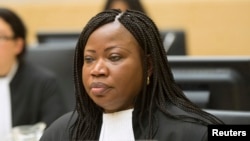UNITED NATIONS —
The chief prosecutor of the International Criminal Court is asking the U.N. Security Council to take action to help see that individuals indicted in war crimes cases in Sudan’s Darfur region are delivered to The Hague for prosecution.
Chief Prosecutor Fatou Bensouda told the 15-nation council that in the almost 10 years since the council first referred the situation in Darfur to the international court, grave crimes still continue unabated because perpetrators think they are safe from arrest and prosecution.
“What is needed is a dramatic shift in this council’s approach to arresting Darfur suspects,” she said.
The court has issued warrants for four individuals - Ahmad Harun, Ali Kushayb, Abdelraheem Hussein and Sudanese President Omar al-Bashir. Bashir faces the gravest charges - war crimes, crimes against humanity and orchestrating genocide in Darfur.
All four, however, have eluded arrest, as the court has no way to enforce the warrants unless the government surrenders them or the indictees travel outside Sudan -- preferably to countries that are signatories to the ICC’s treaty, known as the Rome Statute.
In a report, prosecutor Bensouda noted that in recent months President Bashir has traveled several times - to South Sudan, Ethiopia, DRC and Chad. Bensouda also noted that in Ethiopia, U.N. Deputy Secretary-General Jan Eliasson held a lengthy meeting with President Bashir and she discouraged such meetings.
The United Nations said it only had contacts with ICC indictees when it was absolutely necessary for carrying out its mandated work. The U.N. has one of its largest peacekeeping missions in Darfur.
Bensouda also expressed concern over the recent surge in violence in Darfur that has led to the displacement of an additional 300,000 people this year and a growing humanitarian crisis.
“The deliberate obstruction of humanitarian aid must end. Equally concerning is the ongoing pattern of aerial bombardments and armed attacks on the civilian populations by militia and Janjaweed, and in particular, the involvement of the newest iteration of the Janjaweed - the Rapid Support forces - led by Mohamed Hamdan,” she said.
The prosecutor’s report noted that the Security Council has adopted 55 resolutions on Sudan since 2004 and hardly any of them have been implemented. Bensouda said she hoped the Security Council would view this pattern of non-cooperation by Khartoum as “a serious problem” and take the “necessary measures” to address it.
She said that without stronger action by the Security Council and states parties to the court, the situation was unlikely to improve and the alleged perpetrators of serious crimes against the civilian population would not be brought to justice.
Darfur rebels took up arms against the Sudanese government in 2003. The United Nations says the conflict has killed some 300,000 people and displaced 3 million more. Sudan puts the death toll much lower, at around 10,000.
Chief Prosecutor Fatou Bensouda told the 15-nation council that in the almost 10 years since the council first referred the situation in Darfur to the international court, grave crimes still continue unabated because perpetrators think they are safe from arrest and prosecution.
“What is needed is a dramatic shift in this council’s approach to arresting Darfur suspects,” she said.
The court has issued warrants for four individuals - Ahmad Harun, Ali Kushayb, Abdelraheem Hussein and Sudanese President Omar al-Bashir. Bashir faces the gravest charges - war crimes, crimes against humanity and orchestrating genocide in Darfur.
All four, however, have eluded arrest, as the court has no way to enforce the warrants unless the government surrenders them or the indictees travel outside Sudan -- preferably to countries that are signatories to the ICC’s treaty, known as the Rome Statute.
In a report, prosecutor Bensouda noted that in recent months President Bashir has traveled several times - to South Sudan, Ethiopia, DRC and Chad. Bensouda also noted that in Ethiopia, U.N. Deputy Secretary-General Jan Eliasson held a lengthy meeting with President Bashir and she discouraged such meetings.
The United Nations said it only had contacts with ICC indictees when it was absolutely necessary for carrying out its mandated work. The U.N. has one of its largest peacekeeping missions in Darfur.
Bensouda also expressed concern over the recent surge in violence in Darfur that has led to the displacement of an additional 300,000 people this year and a growing humanitarian crisis.
“The deliberate obstruction of humanitarian aid must end. Equally concerning is the ongoing pattern of aerial bombardments and armed attacks on the civilian populations by militia and Janjaweed, and in particular, the involvement of the newest iteration of the Janjaweed - the Rapid Support forces - led by Mohamed Hamdan,” she said.
The prosecutor’s report noted that the Security Council has adopted 55 resolutions on Sudan since 2004 and hardly any of them have been implemented. Bensouda said she hoped the Security Council would view this pattern of non-cooperation by Khartoum as “a serious problem” and take the “necessary measures” to address it.
She said that without stronger action by the Security Council and states parties to the court, the situation was unlikely to improve and the alleged perpetrators of serious crimes against the civilian population would not be brought to justice.
Darfur rebels took up arms against the Sudanese government in 2003. The United Nations says the conflict has killed some 300,000 people and displaced 3 million more. Sudan puts the death toll much lower, at around 10,000.








